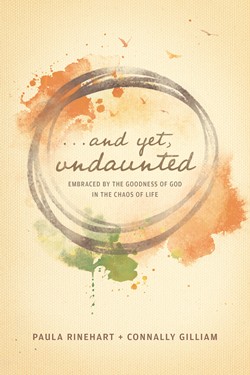What I’m counting on here is not the dream—it’s the faithfulness of God.
by Connally Gilliam and Paula Rinehart, authors of And Yet, Undaunted
Every heart comes up to this fork in the road, many times. Life bruises you—and you are faced again with the choice: Are you going to move toward God and other people, or are you going to tunnel inward to that false-but-safe isolation with which we are all so terribly familiar?
So in those places in your life where you are honestly more inclined to run in every direction but God, I want to recommend to you a coach.
I discovered this guy during the ups and downs of infertility in our family, in a season when I was all-prayed-out. At some point in the world of earnest prayer, you become distinctly aware that you have run up against the word no. Like, really, no. Not going to happen. (And I had hit that wall.)

I was incredibly tempted to just let silence reign between God and me. I didn’t want to turn toward the God who, I felt, had caused the actual pain. How could I draw comfort from the God who had wounded me? (Big question, that.)
I’ve learned through years of listening to others—and listening to my own life—that right at this juncture, we are prone to run away. Like, I’ll get back to God when I’m in better shape and am more confident in him. Much as we might put on lipstick before we walk into a room of people, we want to pretty ourselves up before we bare our insides to the God who can see them anyway.
God, I said, I need someone else’s words to pray here. And then immediately, a thought came to me: What are the worst words in Scripture?

That’s when I was introduced to a cranky, old prophet I didn’t know much about. He became a friend and a guide, and when I get to heaven, I am going to hug his neck, big-time. He’s gotten a bad rap through the years because, as I say, he’s a bit cranky (and with good reason). But oh, he’s been there. He’s lived in the dark places that you and I only visit on occasion.
Moment by moment, for almost a month, I sat with Jeremiah, who sat with God. I let him do the talking. I read the same passage out of the third chapter of Lamentations every morning, until I almost knew it by heart.
You seem to me a bear lying in wait, ready to get me. You have walled me in, and I am trapped. You’ve made my chains heavy. My endurance is nearly gone—and so is my hope.[1]

I was startled by the honesty in Jeremiah’s words. This was God he was talking to. Here was this man who had been thrown into a pit by his equivalent of “other believers”—other practicing Jewish leaders—and he felt betrayed by the living God. His words mirrored what we think in our worst moments of pain and distortion—when it feels like we’ve been left by the side of the road somewhere and nothing good will ever happen again.
Except that we know better. Somewhere in our heads, we know better. But we can’t quite access what we know.
So there I was each morning, watching Jeremiah do the unthinkable. He was wrestling with his distortions of God—with God. The living God was not striking him dead, or sending him away in shame, but holding him close until he could see reality again.

How do I know this? Because if you listen closely, you can hear a giant exhale in his conversation with God. When Jeremiah has spent himself, he stops and breathes deep the air of mercy. Oh, yes, I can almost imagine him saying to himself, I remember.
The steadfast love of the Lord never ceases;
his mercies never come to an end;
they are new every morning;
great is your faithfulness.[2]

Some of the most-loved words of Scripture are Jeremiah’s. They are the words of a man who was in an awful place and washed up on the shore of trust, who is anchored once again by remembering that the Lord is especially good to those who wait for him.[3]
As for Jeremiah, so it began being for me. Every morning, his words squeezed the toxicity out of my soul just a bit more. I could see clearly again. What I’m counting on here is not the dream—it’s the faithfulness of God.

I’m grateful for this man who became my coach in a rough time. He showed me that if I would simply turn to God without my lipstick, risking that he’s actually good, God would meet me. His redemption can take a hundred forms—and it may be quite a while in coming. Sometimes we see only faint hints. Occasionally, it’s as concrete as the sound of a little girl’s laughter in the next room and a song she sings to herself: “We sing glory, hallelujah, the Lamb has overcome.”[4]
[1] Lamentations 3:10-11, author’s paraphrase.
[2] Lamentations 3:22-23.
[3] Lamentations 3:25. (Also see Psalm 37:9; Isaiah 30:18, 49:23, 64:4; and Hebrews 9:28).
[4] Karl Jobe, “Forever,” Majestic © 2014 Sparrow.
 And Yet, Undaunted by Paula Rinehart and Connally Gilliam
And Yet, Undaunted by Paula Rinehart and Connally Gilliam
Life is hard. We often find ourselves walking through stories that don’t feel like they should be ours. And yet here we are. We wonder where our good God is in the midst of it.
But we are not left without hope. In fact—we have the greatest hope of all. Through vulnerable stories and rich insight, Paula Rinehart and Connally Gilliam point to the Larger Story that carries all the anxiety, longing, and beauty of your life. The backdrop of the big gospel story—creation (how life ought to be), the fall (how life is), redemption (how life can be), and restoration (how life will be one day)—gives context to our lives and hope for walking forward. The grand story of the gospel of Jesus Christ frames our every step.
Discover renewed strength and joy in the middle of your ache . . . and the goodness of God that will give you the courage to remain yet undaunted.


